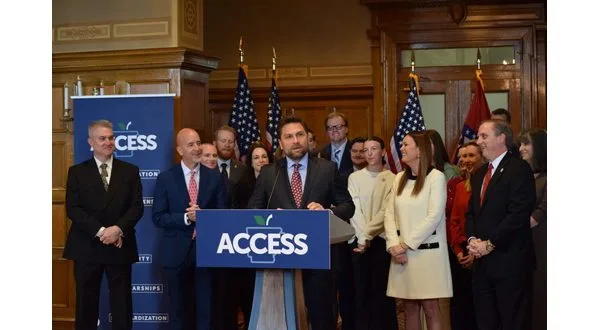
Gov. Sarah Huckabee Sanders announced her Arkansas ACCESS proposal on Friday, but the bills weren’t filed until about 5 p.m. Monday by Republicans Sen. Jonathan Dismang of Searcy and Rep. Matthew Shepherd of El Dorado.
As expected, the bills address higher-education funding, admissions policies, course credit and scholarships. They also would prohibit diversity initiatives and so-called “indoctrination” and allow the revocation of tenure for professors who receive less-than-adequate performance evaluations.
Institutions of higher education also would not be allowed to grant excused absences for students to attend political protests, advocate for social or public policy or to try to influence government policy. The legislation also forbids colleges, universities and two-year programs from authorizing student walkouts for any of those purposes. The same prohibitions would apply to high school students, according to the bills.
In its length and complexity, Arkansas ACCESS – which stands for acceleration, common sense, cost, eligibility, scholarships and standardization – mirrors Sanders’ LEARNS Act omnibus bill in 2023.
Shepherd’s House Bill 1512 and Dismang’s Senate Bill 246 both make substantive changes to existing law affecting higher education, including the repeal of several sections of Title 6 of Arkansas Code, and replacing them with new language.
Even if the bills are adopted as presented, much of the change they aim to bring about will be carried out by rule-making from the Department of Education and various higher-education agencies, according to the proposals.
On Friday, Sanders said her aim is to reduce obstacles in students’ higher-education path.
“Higher education should be available to anyone who wants it, right after high school or many years down the line, and ACCESS will make that a reality,” Sanders said. “We will also get indoctrination out of higher education so students can learn in a free, unbiased setting.”
Regarding affordability of higher education, the bills propose changes in the state’s various scholarship programs, including those funded by the Arkansas Scholarship Lottery. Two lottery-related shell bills were also filed Monday, the deadline for filing bills affecting the lottery.
‘Rejecting discrimination and indoctrination’
On so-called indoctrination, the bills quote Title VI of the Civil Rights Act of 1966 to support their intent to “prevent discrimination, promote intellectual development and protect the free exchange of ideas according to the United States Constitution and the Arkansas Constitution.”
,” collecting information related to DEI or requiring diversity statements from a college or university. Accrediting agencies operate independently of state education systems and use various metrics to determine whether programs within a university, and universities themselves, meet professional and academic standards.
The proposed legislation also forbids any state higher-education institution from spending any state funds or accepting federal funds requiring violation of the section titled “Rejecting Discrimination and Indoctrination in Postsecondary Education.”
Other provisions
The first 48 pages of the bills filed Monday deal with secondary education and would involve changes in rules promulgated by the State Board of Education. The bills would consolidate a number of high school college-level courses into a single “accelerated learning” program that prepares students interested in pursuing higher education to succeed and seeks to increase the number of students who graduate from institutions of higher education.
Public school districts would be encouraged to develop accelerated learning curriculums and policies to “increase the number of students prepared to enter science, technology, engineering and mathematics fields” either at the college level or in related training programs.
Public school districts and open-enrollment public charter schools would be required, starting in the 2025-26 school year, to offer at least four accelerated learning courses in math, English, science and social studies, according to the legislation.
The bills also address concurrent courses, classes students can take that earn them academic credit toward high school graduation and for college coursework. The details include establishing a formula for determining the tuition fees charged for such courses.
As part of the governor’s goal of streamlining higher education processes, the bills propose creating a universal college application, a common course-numbering system among all institutions, a direct admissions program that would establish provisional admission to students who meet basic standards and a statewide transfer system that would allow the transfer of college credits between universities and two-year institutions to work both ways.
The legislation also would amend the state’s “productivity-based funding model” for two-year and four-year institutions and allow the Division of Higher Education to promulgate rules implementing the model, including a “return-on-investment’ metric. The model would be used to “align institutional funding with statewide priorities.”
The bills also would change the membership of key policymaking bodies, including the Safe Schools Committee, Higher Education Coordinating Board and School Leadership Coordinating Council.
To view this story, or for more news updates from Arkansas Advocate, click here.
WebReadyTM Powered by WireReady® NSI










